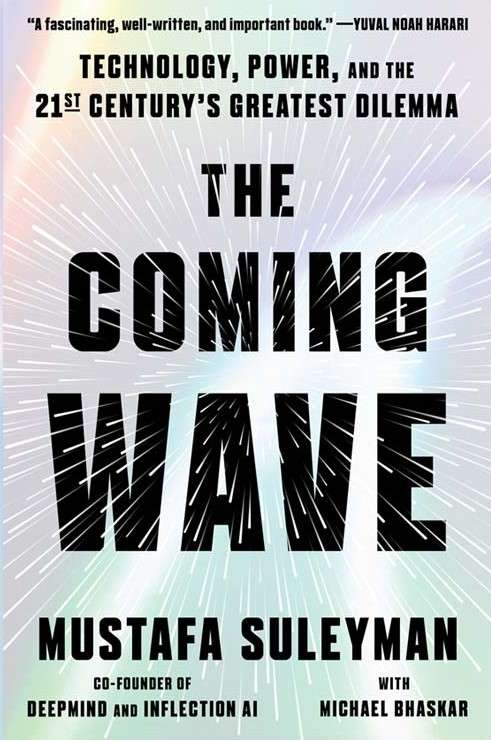Mustafa Suleyman with Michael Bhaskar, The Coming Wave: Technology, Power, and the 21st Century’s Greatest Dilemma (New York: Crown, 2023)
Reviewed by Khansa Qureshi
In the book The Coming Wave: Technology, Power, and the 21st Century’s Greatest Dilemma, authored by Mustafa Suleyman with Michael Bhaskar, the authors argue that humans as a species are approaching a critical threshold in history where everything is about to change. In the introductory chapters, they set out by analysing the historical technological waves, their contexts, and how they impacted the human civilisation over the epochs. Both are of the view that these technological waves have played a significant role in shaping human history, from ancient flood myths to the rise and fall of empires, extending to their widespread use in everyday life.
More specifically, this joint work explores a new, upcoming technological wave, with AI and synthetic biology as the defining systems that hold massive potential for wealth creation and global development but also pose immense challenges to the humankind that could be impossible to contain (p.21). The duo warns that in this coming wave, our species will be confronted with questions about genome editing, disease immunities, superintelligence, and mortality, especially in relation to our position at the top of the evolutionary pyramid compared to AI systems potentially becoming smarter and more capable than us. They examine how, in this new wave, what they term ‘homo technologicus’ – the human species – faces the challenge of containing the unleashed power of technology. This challenge, as they note, is a significant departure from the historical focus on creating and harnessing technological power (p. 61).
As a high-tech insider at the forefront of major AI developments, Suleyman’s work in particular, has remained partly positive and partly foreboding, discussing the vast possibilities offered by these technologies. Simultaneously, he has been cautioning about the risks they pose to fundamental global governance structures, noting the aloofness of many governments to this looming threat. Hence, one of the key challenges that the book discusses are the implications of the technological advancements on the nation-state and governance. It draws attention to the declining trust in national governments and institutions, exacerbating the challenge of managing and containing technology (p. 173). The authors contend that with the acceleration of technological developments, it becomes crucial to strengthen nation-states and enhance their institutional integrity.
Suleyman and Bhaskar also maintain that newly invented technologies typically become more affordable and accessible over time, fuelling a cycle of continuous innovation. In the book, they also explore historical resistance to technological advancements, citing examples like the banning of the printing press in the Ottoman Empire (p. 52) and the Luddites’ destruction of industrial machinery (p. 305). They also note the eventual, inevitable spread of these technologies. They describe the tendency of technologies to disseminate broadly in waves, with unpredictable and often uncontrollable emergent impacts, including negative and unforeseen consequences, as a significantly magnified ‘containment problem’ (p. 129). Drawing parallels with phrases from the Cold War era, the book cautions against a form of technological expansionism akin to the spread of communism (p. 50). Unlike communism, however, these technologies won’t be imposed on humanity; instead, they will be willingly adopted due to their potential to address critical global challenges, such as climate change, resource scarcity, world hunger, and incurable diseases. This voluntary adoption, the authors note, presents a unique ‘containment problem,’ as the emergence of these technologies is unprecedented in scale and complexity (pp. 129, 132). Consequently, they emphasise that maintaining control over these potent technologies represents one of the most crucial challenges of our era.
Suleyman and Bhaskar assert that humanity has only a limited window to act decisively before losing control over emerging technologies. They acknowledge that while regulation might seem an attractive solution, a deeper examination reveals significant shortcomings in this approach (p. 246). The lack of clear answers for containing these technologies often leads to a sense of despair, causing people to shy away from these issues. This tendency, which they label the ‘pessimism aversion trap,’ is something they caution against (p. 168). Instead, they propose a comprehensive ten-step containment strategy. This strategy includes regulation, improved technical safety, new governance and ownership models, and enhanced accountability and transparency, all crucial yet not solely sufficient, steps towards safer technology. They describe this multifaceted approach as a comprehensive framework that combines advanced engineering, ethical considerations, and government regulation (p. 50).
Even though Suleyman and Bhaskar’s ten-part containment proposal is thorough, its effectiveness hinges on implementation, a challenge the authors acknowledge. The solution proposed or any other regulation or containment mechanism is then the Gordian Knot of the ‘coming wave.’ For this reason, their forward has been termed as a ‘utopian dream’, and not the panacea for the many challenges associated with the wave defined by AI and synthetic biology.
Nonetheless, the book serves as a wake-up call, urging humanity to avoid sleepwalking into self-annihilation. Despite its disturbing undertones, it is an essential guide for understanding the imminent technological revolution and the world it is creating. It is especially relevant for policymakers worldwide, offering insights into the challenges to global politics arising from technological advancements.
Khansa Qureshi is a Research Assistant at the Centre for Aerospace & Security Studies (CASS), Islamabad, Pakistan. She can be reached at cass.thinkers@casstt.com




